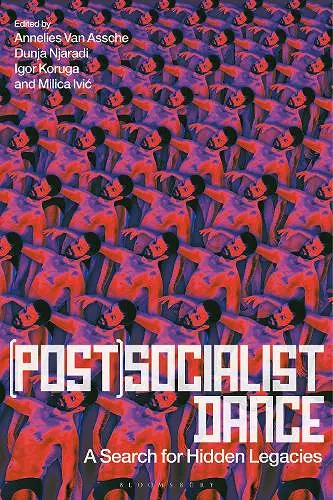(Post)Socialist Dance
A Search for Hidden Legacies
Annelies Van Assche editor Dunja Njaradi editor Igor Koruga editor Milica Ivic editor
Format:Hardback
Publisher:Bloomsbury Publishing PLC
Published:31st Oct '24
Currently unavailable, and unfortunately no date known when it will be back

This book sets out to search for the ‘lost’ Second World in dance studies and the way it appears and reappears in today’s globalized world.
This book sets out to search for the Second World — the (post)socialist context — in dance studies and examines the way it appears and reappears in today’s globalized world.
It traces hidden and invisibilized legacies over the span of one century, probing questions that can make viewers, artists, and scholars uncomfortable regarding dance histories, memories, circulations and production modes in and around the (post)socialist world. The contributions delve into a variety of dance practices (folk, traditional, ballet, modern, contemporary), modes of dance production (institutionalization processes, festival-making and market logics), and dance circulations (between centres and peripheries, between different genres and styles). The main focus is Eastern Europe (including Russia) but the book also addresses Cuba and China. The book’s historical examples make the reader aware, too, of the (post)socialist bodies’ influence in today’s dance, including in contemporary dance scenes.
The (post)socialist context promises to be a prosperous laboratory to explore uncomfortable questions of legitimacy. Whose choreographic work is staged as a ‘quality’ dance production? Which dance practices are worthy of scholarly study? What are the limits of dance studies’ understanding of what dance is or should be? In view of reclaiming the Second World through dance, this book thus probes questions that should be asked today but are not easy to answer; questions that dance practitioners, facilitators, critics, and researchers, including ourselves, are often not at ease with either. In doing so, the cracks of dance history begin to be sealed, and neglected dance practices are written back into history, provided with the academic recognition that they deserve.
(Post)Socialist Dance reveals a set of broad socio-cultural and political landscapes that constitute a self-standing field of embodied knowledges, insufficiently recognised in the Western canon thus far. Several local yet related case studies by the local artists and researchers, presented in convergence with Western scholars, illuminate a parallel epistemology of Dance that may be read alongside histories from marginalised cultures of the Global South. There is a range of insightful examples from different, more and less recent, histories of dances in socialist societies across 20th and 21st centuries. As a collection, the book reveals new modes of seeing Dance as a social entity that shifts in different moments of crises , including various wars, the breakdown of European socialisms, and grappling with the swarm of neoliberal structures. The book is inspiring in its revelations about the resilience of dance makers who adapt to the advantages and disadvantages of art production in the shifting political and economic contexts. * Dr. Tamara Tomic-Vajagic, Dance and Visual Culture scholar, University of Roehampton, UK *
ISBN: 9781350408159
Dimensions: unknown
Weight: unknown
240 pages